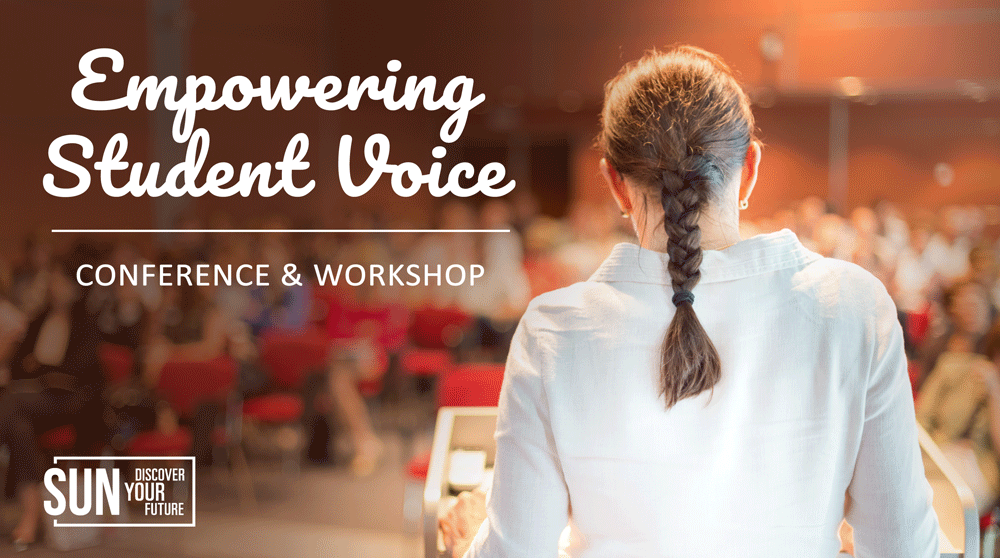Empowering Student Voice: Teacher Resource Page
Empowering Student Voice: Teacher Resource Page
Welcome to our Empowering Student Voice: Teacher Resources area. Below you will find links to a range of useful information, guidance, and resources all related to embedding student voice in schools.

Empowering Student Voice Project
The SUN have designed an Empowering Student Voice workshop that can be delivered in schools to your student council, alongside an annual conference taking place on a partner university campus.

Email: pthompson@bournemouth.ac.uk for information and enquiries.

EQUITABLE VOICE
The way in which your student council members are elected is an important part of ensuring equitable representation of student voices from across the school. Furthermore, allocating roles and responsibilities is an effective mechanism to ensure the council gathers feedback that reflects all student perspectives.
Schools utilise a variety of different methods to elect their student council members. If your school aims to have student voice at the centre of your election system, it can be beneficial for candidates to submit a document detailing why they want to be a council member and what issues are important to them. This document can resemble a very simplified manifesto.
Delegating roles to different council members can support the ambition of gaining as much feedback from the student community as possible, thus helping your council to enact change. Additionally, having particular responsibilities gives students the opportunity to gain valuable experience performing particular roles (e.g. chairing meetings). This system also makes it clear to external observers, such as Ofsted, what the aims of the council are, and that you are achieving the school’s legal responsibility to embed democratic practice.
Conducting a student voice audit enables the student councillors and the supporting teacher to think critically about their practice. As part of the audit, participants rate the extent to which they agree or disagree with a series of questions that relate to student voice practice in their school. Participants then consider their hopes for future student voice work.
(Please note: the resource above references dates in the past. However, the content is still relevant and can be utilised for any academic year)
Our Empowering Student Voice workshop is designed to support Student Councils to consider how they can ensure they are hearing from everyone in their student community. It encourages them to create an action plan to support this.
This tool, created by Participation People, can be used to help support your youth voice meetings.

CO-PRODUCTION
This section explores what co-production is and how co-productive principles can be utilised within Student Councils and student voice groups.
There are lots of different definitions of co-production. Here in the SUN, we’ve adopted this one:
An approach where people work together as equals, towards a shared goal, through shared learning and shared responsibility.
Co-production encourages us to view service users as experts with knowledge and skills that should be harnessed to enact positive change. In the context of Student Councils or student voice groups, this is about truly placing students at the centre of decision-making.
Boingboing describes co-productive values and principles as follows:
- Inclusive – giving all participants the opportunity to make meaningful contributions
- Asset/strength-based
- Based on mutuality and cooperation to achieve a shared goal or interest
- Viewing students as capable, active agents
- Requiring those with hierarchical power (e.g. school staff/leadership teams) to listen actively to those with less hierarchical power (students)
This video from HeadStart Wolverhampton provides an overview of what co-production looks like in practice:
By utilising the principles of co-production, school councils can create inclusive and effective practices.

COUNCIL CONTACT WITH DECISION MAKERS
It is important that School Councils are accepted as part of the school governance system. They represent one part of the triad of school governance, along with parents and school staff. This section provides support on how to develop a framework of participation, so that school council members have contact with decision makers.
This interaction can take many different forms. A common touch point between all school representatives is at governing body meetings, where the Student Council is given the opportunity to share their agenda with the governing body.

MANAGING DISCUSSION & CONFLICT
In a school council environment, it is likely that students are going to have conflicting opinions. This section provides helpful tips and resources to support managing conflict.
It is the teacher’s responsibility to act as a mediator during discussions. The purpose of this role is to validate all perspectives but reach a democratic conclusion. When facilitating these conversations, it can be useful to follow the British parliamentary style of debating, encouraging students to present their argument whilst backing it up with evidence. Students should remain respectful to the individual(s) presenting opposing arguments.
Council members may have to present opinions and perspectives that they do not agree with on behalf of their peers. It is important for council members to actively listen to their peers when they are gathering feedback. They should develop an understanding that as a representative, objectivity is essential.
For more great resources for your students involved in student voice activities, head over to our Empowering Student Voice: Student Resource page.




